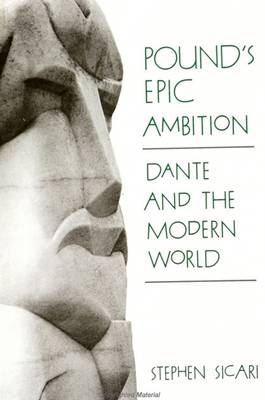
- Afhalen na 1 uur in een winkel met voorraad
- Gratis thuislevering in België vanaf € 30
- Ruim aanbod met 7 miljoen producten
- Afhalen na 1 uur in een winkel met voorraad
- Gratis thuislevering in België vanaf € 30
- Ruim aanbod met 7 miljoen producten
Zoeken
Omschrijving
This book is both an introductory overview of The Cantos and a detailed analysis advancing the knowledge of even the most sophisticated specialist. Sicari's analysis gives a clear orientation to the often bewildering but ultimately rewarding world of this difficult epic poem and shows that beneath the surface of the poem is the classical figure of the epic wanderer whose journey provides the "plot" of the poem.
Non-specialists will appreciate Sicari's synthesis of a wide range of material. Sicari explores how Dante and the epic tradition informs The Cantos; those interested in the epic should find Sicari's study an important contribution to the field. Those studying modernism in general will see in Sicari's definition of the modern epic useful ways to study the other great achievements of high modernism, especially those of Yeats, Eliot, and Joyce. Those interested in the relation between literature and politics will find this book especially informative, for Sicari is one of the few critics on Pound who does not ignore Pound's politics, or simply castigate him for the unfortunate views he adopts and advocates. The analysis of Pound's fascism is a sub-theme that sheds new light on how politics enters a great modernist poem and affects its shape and intention.
Non-specialists will appreciate Sicari's synthesis of a wide range of material. Sicari explores how Dante and the epic tradition informs The Cantos; those interested in the epic should find Sicari's study an important contribution to the field. Those studying modernism in general will see in Sicari's definition of the modern epic useful ways to study the other great achievements of high modernism, especially those of Yeats, Eliot, and Joyce. Those interested in the relation between literature and politics will find this book especially informative, for Sicari is one of the few critics on Pound who does not ignore Pound's politics, or simply castigate him for the unfortunate views he adopts and advocates. The analysis of Pound's fascism is a sub-theme that sheds new light on how politics enters a great modernist poem and affects its shape and intention.
Specificaties
Betrokkenen
- Auteur(s):
- Uitgeverij:
Inhoud
- Aantal bladzijden:
- 249
- Taal:
- Engels
- Reeks:
Eigenschappen
- Productcode (EAN):
- 9780791407004
- Verschijningsdatum:
- 27/09/1991
- Uitvoering:
- Paperback
- Formaat:
- Trade paperback (VS)
- Afmetingen:
- 152 mm x 229 mm
- Gewicht:
- 362 g

Alleen bij Standaard Boekhandel
+ 106 punten op je klantenkaart van Standaard Boekhandel
Beoordelingen
We publiceren alleen reviews die voldoen aan de voorwaarden voor reviews. Bekijk onze voorwaarden voor reviews.










